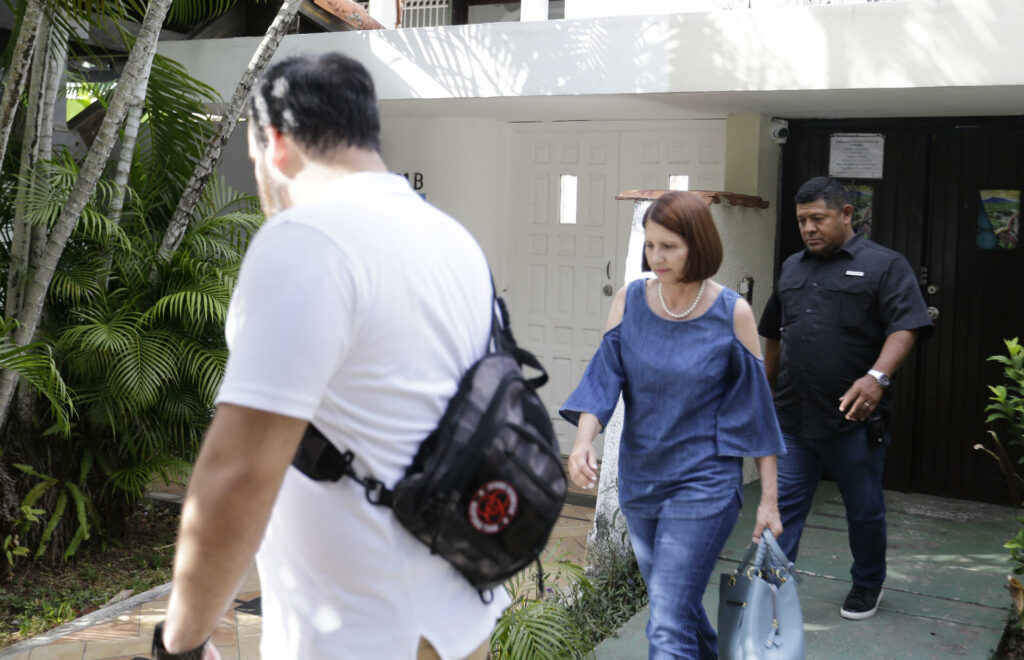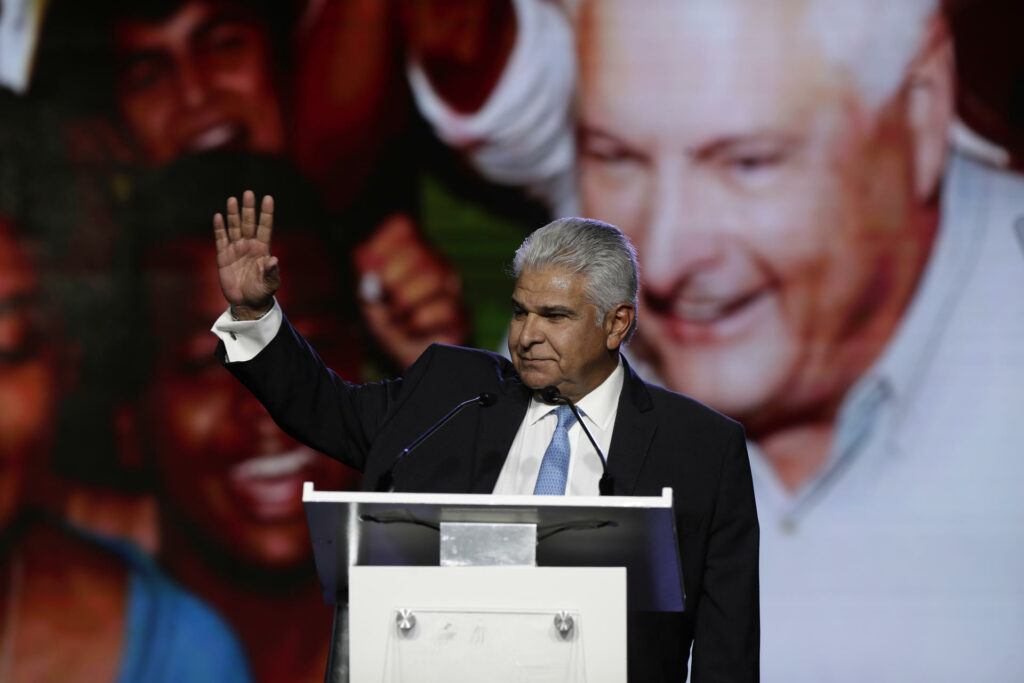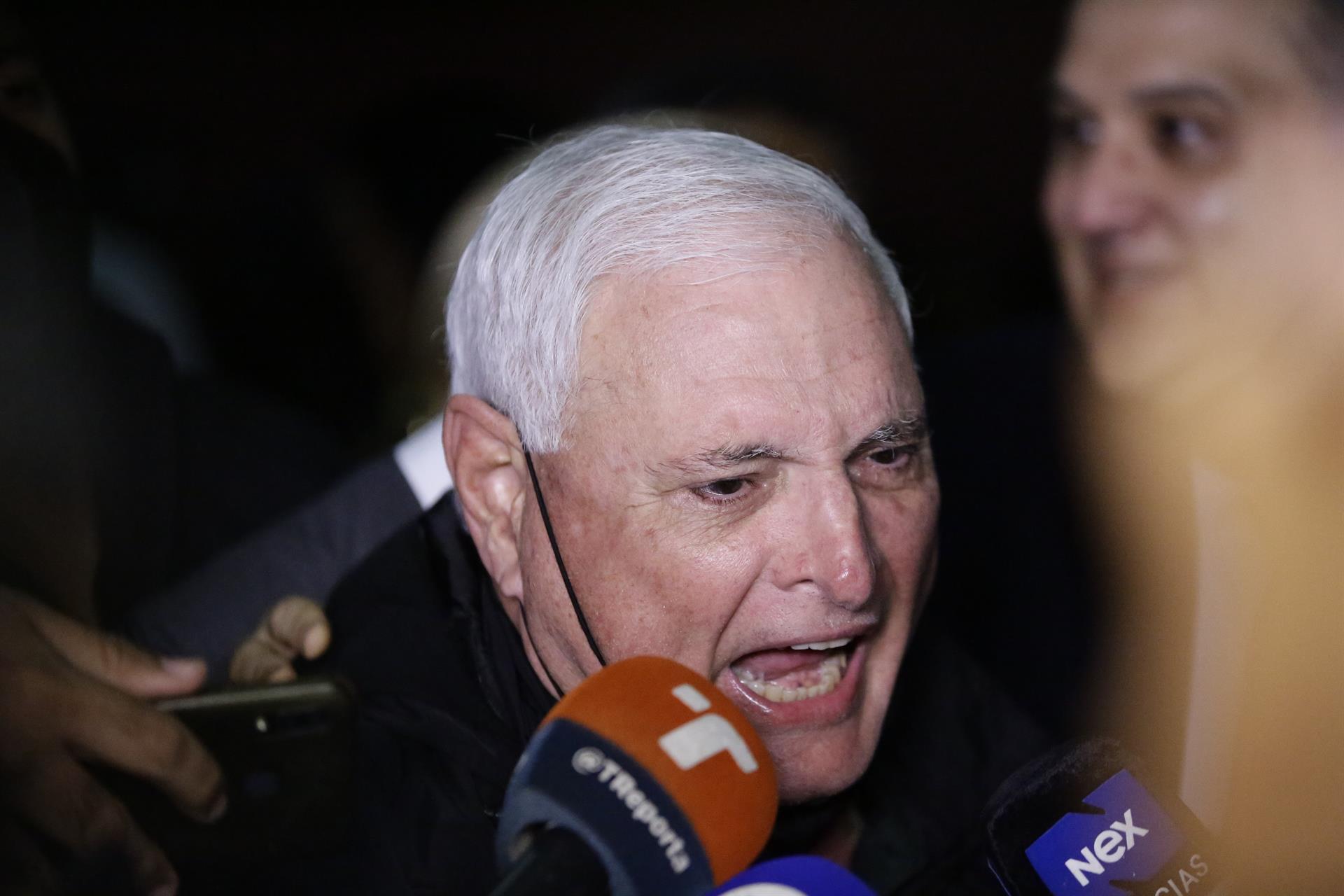The fog slowly disappears, revealing the outlines of Panama City. The light streaming through the avenues illuminates the faces on political posters. It’s Monday morning, April 29th. The upcoming elections on May 5th have placed the Electoral Tribunal (ET) in the media spotlight.
Away from the ET, in the Betania district, the stifling silence is barely interrupted by neighbors chatting, people going about their work, or a housewife’s voice. Outside the Nicaraguan Consulate, located between the neighborhoods of Dos Mares and La Alameda, a group of people stand in line. The two-story building rests under the morning heat. For over two months, it has been the refuge of former President Ricardo Martinelli, convicted of money laundering.
The diplomatic headquarters is marked by the Nicaraguan flag and coat of arms. Behind a covered gate is a white wall topped with barbed wire. Further back, the second floor windows are visible.
Two police posts control access to the premises. Nearby are mansions with luxury cars parked amidst fountains and ground-level lawns. Some are surrounded by high walls covered in vines, with balconies behind the gates. Everywhere, political propaganda banners hang.
Recibe nuestro boletín semanal
A tall, dark-skinned man in a brown sweater, holding a radio, manages the line. One by one, Nicaraguans cross the gate and enter the residence consisting of duplexes 61A and 61B, attached to the Consulate. Once inside, they go on with their procedures as usual, as reported to DIVERGENTES.
However, these actions do not have the Panamanian Foreign Ministry’s approval. On March 4th, Nicaragua informed Panama of its intention to use the residence adjoining the Consulate to assist its citizens. The Panamanian government, citing Article IV of the 1963 Vienna Convention, did not authorize this expansion of the diplomatic premises.
Before that, the Ministry of Foreign Affairs had denied a safe conduct for Martinelli to leave the country and warned that any political statements or comments by the former president could be considered “interference in Panama’s internal affairs.”
On April 22nd, the Ministry called the Panamanian ambassador in Nicaragua, accusing Nicaragua of “allowing, under the guise of alleged illegal protection in accordance with international law,” Martinelli to engage in actions “for partisan purposes.”
Martinelli, a political actor from his refuge in the embassy
This happened on Sunday, April 28th, during the closing event of José Raúl Mulino’s campaign, who replaced Martinelli in the presidential race after his disqualification by the Electoral Tribunal. Martinelli, through a video, urged support for candidates from his Realizando Metas party, now represented by Mulino, who leads in the polls. “We’ll see each other out there very soon,” he assured.
While the services provided at the Consulate have not been continuous since Martinelli was granted asylum, DIVERGENTES, during a visit to the diplomatic headquarters, confirmed that the adjoining residence housing Martinelli was being used for consular procedures.
“It’s the same house,” said an official who identified herself as “Dayla.” But a source from the Panamanian Foreign Ministry reiterated that they do not recognize “this new area as part of their diplomatic mission,” although there has been no official response yet to Nicaragua’s actions.
Martinelli is constantly visited

The person managing the line steps out again and, seeing no one waiting, puts away a board with instructions. Others exit the residence and enter the adjoining area, where Martinelli receives a visit from one of his lawyers. A man brings in a box containing what appears to be an air conditioning unit or other household appliances.
Panamanian media reported that since his arrival at the Nicaraguan diplomatic headquarters, Ricardo Martinelli has turned the place into his small hotel. It has been equipped and stocked with a plethora of items, appliances, drinks, and food.
According to Panama’s La Prensa newspaper, technicians arrived first to install air conditioners; then other workers appeared to measure and install a type of mesh to cover the windows of the room where the former president would sleep, among other comfort-enhancing works for Martinelli.
A young man wearing an “RM” sweater—Realizando Metas party—appears at the gate. A woman leaves the Consulate with bags from Super 99 and Megadepot, two businesses through which Martinelli earned his fortune, estimated at around a billion dollars. It’s a busy morning between the two houses.
Political asylum norms changed
Since Martinelli sought asylum, family members, politicians, jurists, a pastor, and even boxing legend Roberto Durán have visited him at the Nicaraguan embassy. The politician receives his visitors in a renewed environment, with TVs, mattresses, and other additions to the embassy’s furnishings.
“Martinelli has changed the norms of asylum,” suggests former diplomat Julio Yao, who participated in negotiations between the United States and Panama that culminated in the transfer of the Canal from American to Panamanian hands.



He adds that Martinelli’s and Mulino’s fates are currently intertwined. If Mulino wins the elections, following the Supreme Court’s ruling against a lawsuit seeking to disqualify him, Martinelli could benefit from a pardon.
The candidate has already stated that if he becomes President, he would help him escape a prison sentence of over 10 years for laundering public funds used to purchase print media.
The Hague might intervene
The former diplomat comments that if neither Nicaragua nor Panama backs down, the matter could be resolved through an advisory opinion requested from the International Court of Justice in The Hague.
This body would then analyze whether the former president qualifies for asylum under the 1928 Convention. Although this could take some time, Yao believes that everything depends on Panama’s willingness to find a resolution to the tension between the two countries.
Lawyer and analyst Rodrigo Noriega emphasizes that one of the Foreign Ministry’s options is to declare Consuelo Sandoval Meza, the propagandist appointed by Daniel Ortega as the new ambassador to Panama last year, as persona non grata. If this course of action is adopted, Sandoval would have five days to leave the country. This would serve to reaffirm the importance of the issue for Panama, Noriega says.
If tensions sparked by Martinelli’s activities at the Consulate escalate, Noriega suggests that the next step would be a diplomatic rupture. He mentions that mediation by a third country could be sought, but believes this would not have much impact given the “interests” behind the diplomatic embrace extended to the politician by Nicaraguan diplomats.
Jolts in the Final Stretch of the Elections

On Friday, May 3rd, 2024, the Panamanian Supreme Court ruled against a lawsuit filed by lawyer Karisma Etienne Karamañites. In March, she requested the annulment of one of the points in the agreement through which the Electoral Tribunal disqualified Martinelli and put Mulino in the race as his substitute.
The court’s resolution on Friday finally opened the doors for Mulino to be part of the electoral ballot, and if the polls are accurate, to then reach the presidency.
The agreement that disqualified Martinelli’s candidacy and accepted Mulino’s candidacy pitted the Supreme Court against the Electoral Tribunal. Luis Guerra, one of the three magistrates of the Electoral Tribunal, responded to criticisms, rejecting the need to consult with the parties that nominated Martinelli, Realizando Metas and Alianza, before making a decision based on the electoral code’s provisions on the substitution of candidates.
Among the criticisms of Mulino’s candidacy are that if he assumes the presidency, he would not have a vice president, as the candidacy remained incomplete after Martinelli’s conviction and disqualification; and that Mulino was not elected through a primary process by the Realizando Metas party, unlike the former president.
It has been a challenging few weeks for the entity responsible for organizing the elections. In addition to the repeated objections to Mulino’s candidacy, the ET has been criticized for early voting processes abroad and the electronic voting system.
The voting by Panamanians residing outside the country was interrupted last week after an irregularity was detected in the order in which candidates appeared on the digital ballot, differing from the printed ones.
It later resumed after the Electoral Tribunal dismissed any possible impact on the results. Likewise, electronic voting was suspended after a consensus was reached by political parties. Traditional ballots will be used in the 20 centers previously designated for this system.
All these situations have contributed to an atmosphere of uncertainty in one of the most atypical and complex elections in recent times. Elections that Martinelli will surely continue to follow from his political bunker.

